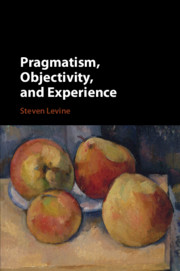
-
Select format
-
- Publisher:
- Cambridge University Press
- Publication date:
- 17 January 2019
- 24 January 2019
- ISBN:
- 9781108525534
- 9781108422895
- 9781108435925
- Dimensions:
- (228 x 152 mm)
- Weight & Pages:
- 0.51kg, 270 Pages
- Dimensions:
- (229 x 152 mm)
- Weight & Pages:
- 0.407kg, 274 Pages
- Subjects:
- Epistemology and Metaphysics, Philosophy
You may already have access via personal or institutional login- Subjects:
- Epistemology and Metaphysics, Philosophy
Book description
In this book Steven Levine explores the relation between objectivity and experience from a pragmatic point of view. Like many new pragmatists he aims to rehabilitate objectivity in the wake of Richard Rorty's rejection of the concept. But he challenges the idea, put forward by pragmatists like Robert Brandom, that objectivity is best rehabilitated in communicative-theoretic terms - namely, in terms that can be cashed out by capacities that agents gain through linguistic communication. Levine proposes instead that objectivity is best understood in experiential-theoretic terms. He explains how, in order to meet the aims of the new pragmatists, we need to do more than see objectivity as a norm of rationality embedded in our social-linguistic practices; we also need to see it as emergent from our experiential interaction with the world. Innovative and carefully argued, this book redeems and re-actualizes for contemporary philosophy a key insight developed by the classical pragmatists.
Reviews
‘Levine's book foregrounds the concept of objectivity, and in terms of it seeks to articulate various strains of pragmatist thought about experience and justification. His study is well-informed, richly detailed, systematically elegant and philosophically insightful.’
Source: Notre Dame Philosophical Reviews
‘Levine took up and succeeded in the task of creating a lively, extensive and productive conversation between the classical pragmatists and more recent figures in post-analytic philosophy … [his] book represents an important contribution to pragmatist philosophy.’
Source: European Journal of Pragmatism and American Philosophy
Contents
Metrics
Altmetric attention score
Full text views
Full text views help Loading metrics...
Loading metrics...
* Views captured on Cambridge Core between #date#. This data will be updated every 24 hours.
Usage data cannot currently be displayed.
Accessibility standard: Unknown
Why this information is here
This section outlines the accessibility features of this content - including support for screen readers, full keyboard navigation and high-contrast display options. This may not be relevant for you.
Accessibility Information
Accessibility compliance for the PDF of this book is currently unknown and may be updated in the future.


